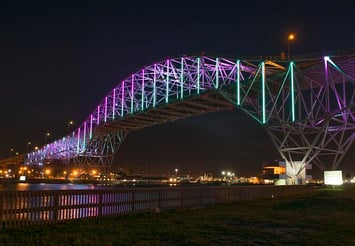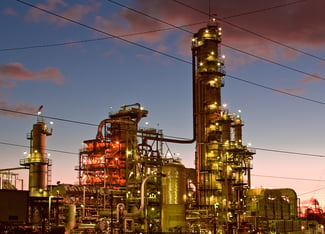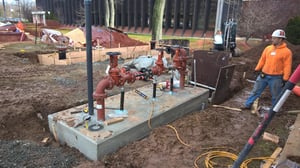
On Dec. 1, 2016, the city of Corpus Christi, TX, started getting calls about dirty and smelly water from Ergon Asphalt and Emulsions, an asphalt plant. There were also calls on Dec. 7 and 12. After the fourth complaint that month, the site was investigated. Unable to find the source of the problems, the city called in the Texas Commission on Environmental Quality (TCEQ).
On Dec. 14, the entire city was told not to use the water. This was much more severe than a boil water advisory. Residents couldn't take showers or wash their clothes and they could not drink the water even if they tried to purify it. Over the next four days, the city, along with the help of TCEQ and the EPA, was able to find the source, fix it, and flush the system.
By 11 a.m. on Dec. 18, the whole city could once again use the water.
Officials found that the backflow preventer at the asphalt and emulsions plant was not working properly. It had failed and let a chemical called Indulin AA-86 as well as hydrochloric acid into the water supply. According to Hydroviv, a water filter manufacturer, this likely meant that the Indulin AA-86 which had backflowed into the water supply was already mixed to form an emulsion and it was likely that an entire tank had backflowed. An entire 8,000-gallon tank of proprietary chemicals was poured into the public drinking water supply. A properly working RPZ installed on the incoming water supply to the tank could have prevented the entire incident.
Aftermath
One month after the scare, water officials were still trying to piece together what actually happened. It's oddly still unclear whether there was a backflow preventer present or if it had failed. Local news was unable to say for certain which it was and, additionally, whether the chemical Indulin AA-86 was ever present in the system at all. This uncertainty comes partly from the fact that samples of the water taken by the TCEQ Dec. 15th-18th came back negative for the contaminant.
However, starting on Dec. 1st, there were repeated calls about the quality of the water. The calls led to the investigation and a flush of the system by the TCEQ and EPA. According to the TCEQ and their reports during the situation, there was indeed a backflow preventer present at the site.
Whatever the facts, many residents had to go without water for four days. The companies deemed responsible, Valero and Ergon Asphalt and Emulsions Inc., have been subject of multiple lawsuits. In response to the water ban, the city council began holding talks about how to improve their water system to keep this from happening again.
 Changes Made
Changes Made
At first, the city council reportedly was disinclined to change existing codes. They opted for better enforcement of their current codes. Basically, they decided that if a customer didn't comply with backflow testing regulations, their water could be cut off. At the time, 39% of residential and 13% of commercial businesses were delinquent regarding backflow prevention. This didn't take into account some industrial customers, because they are technically outside city limits and aren't beholden to city codes. To solve that problem, the city council introduced new requirements for the 79 industrial companies.
Going forward, they'll need to file annual paperwork showing site plans with infrastructure location and maintenance records, accompanied by an affidavit. They'll also need to have their backflow preventers tested, show the locations of all backflow prevention devices, and have an engineer sign off that all potential hazards have been addressed. The rules were created shortly after the water ban, and the city gave the industrial companies two weeks to comply.
As of December 2017, one year after the ban, only half of the companies had complied, and the city was allowing the rest extensions. In June 2018, the city decided to relax regulations on residential water customers. They've said the risks related to residential backflow preventers are much lower and therefore, backflow preventers need not be tested every three years. Now they are only required to be tested when installed or after a repair. In many cities, backflow preventers are tested annually and it's unclear what caused this backward decision.
 The city also created a backflow prevention program, updated its website, and hired a new water director, Clarence Wittwer, with the intent to repair public trust. Additionally, three new water towers are being built to help improve the city's water pressure. Corpus Christi has dealt with water pressure problems for a long time and it's a very common problem for older cities. Installing the water towers should lead to less backflow and better backflow prevention.
The city also created a backflow prevention program, updated its website, and hired a new water director, Clarence Wittwer, with the intent to repair public trust. Additionally, three new water towers are being built to help improve the city's water pressure. Corpus Christi has dealt with water pressure problems for a long time and it's a very common problem for older cities. Installing the water towers should lead to less backflow and better backflow prevention.
Corpus Christi Made Much Needed Progress
Obviously, Corpus Christi's city council, water department, and city manager have taken their water quality problems seriously and made some necessary changes over the past couple of years. It's important their efforts are recognized. It's also important to note, however, that some of their problems originated not from a lack of regulation, but from a lack of follow-through. Their requirements weren't always enforced, which city council has even admitted when deciding whether to move forward with new requirements or to simply try harder to enforce the old ones. With a more comprehensive Cross Connection Control Program and stricter enforcement of the program, hopefully, the city's water woes have come to an end.




